when,where,why引导的定语从句
when引导的定语从句的用法
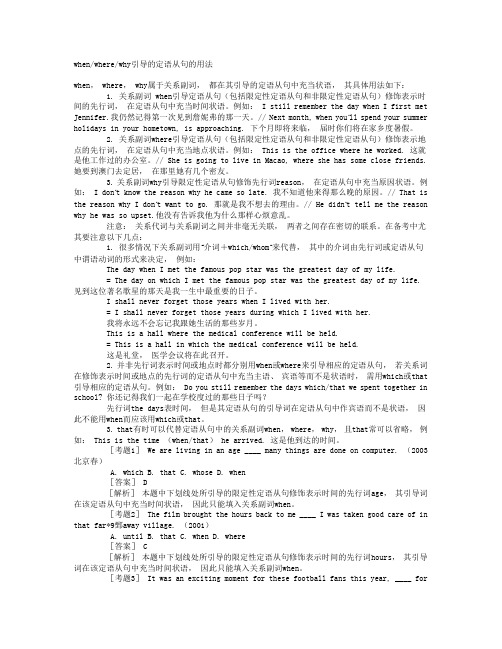
when/where/why引导的定语从句的用法when, where, why属于关系副词,都在其引导的定语从句中充当状语,其具体用法如下:1. 关系副词 when引导定语从句(包括限定性定语从句和非限定性定语从句)修饰表示时间的先行词,在定语从句中充当时间状语。
例如: I still remember the day when I first met Jennifer.我仍然记得第一次见到詹妮弗的那一天。
// Next month, when you’ll spend your summer holidays in your hometown, is approaching. 下个月即将来临,届时你们将在家乡度暑假。
2. 关系副词where引导定语从句(包括限定性定语从句和非限定性定语从句)修饰表示地点的先行词,在定语从句中充当地点状语。
例如: This is the office where he worked. 这就是他工作过的办公室。
// She is going to live in Macao, where she has some close friends. 她要到澳门去定居,在那里她有几个密友。
3. 关系副词why引导限定性定语从句修饰先行词reason,在定语从句中充当原因状语。
例如: I don’t know the reason why he came so late. 我不知道他来得那么晚的原因。
// That is the reason why I don’t want to go. 那就是我不想去的理由。
// He didn’t tell me the reason why he was so upset.他没有告诉我他为什么那样心烦意乱。
注意:关系代词与关系副词之间并非毫无关联,两者之间存在密切的联系。
在备考中尤其要注意以下几点:1. 很多情况下关系副词用“介词+which/whom”来代替,其中的介词由先行词或定语从句中谓语动词的形式来决定,例如:The day when I met the famous pop star was the greatest day of my life.= The day on which I met the famous pop star was the greatest day of my life.见到这位著名歌星的那天是我一生中最重要的日子。
定语从句 2
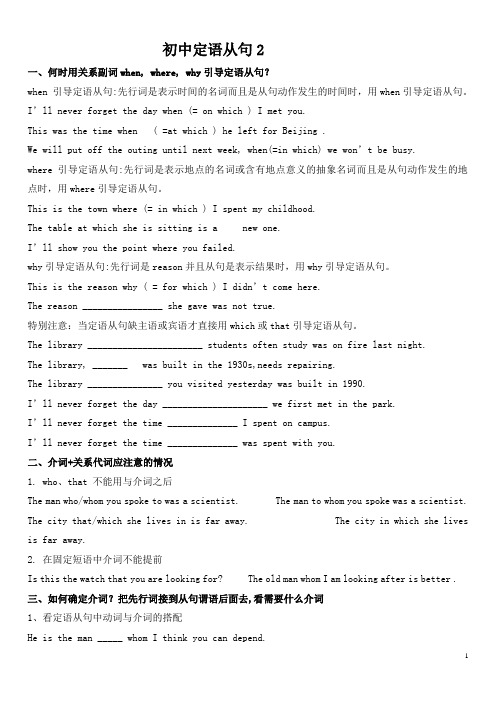
初中定语从句2一、何时用关系副词when, where, why引导定语从句?when 引导定语从句:先行词是表示时间的名词而且是从句动作发生的时间时,用when引导定语从句。
I’ll never forget the day when (= on which ) I met you.This was the time when ( =at which ) he left for Beijing .We will put off the outing until next week, when(=in which) we won’t be busy.where 引导定语从句:先行词是表示地点的名词或含有地点意义的抽象名词而且是从句动作发生的地点时,用where引导定语从句。
This is the town where (= in which ) I spent my childhood.The table at which she is sitting is a new one.I’ll show you the point where you failed.why引导定语从句:先行词是reason并且从句是表示结果时,用why引导定语从句。
This is the reason why ( = for which ) I didn’t come here.The reason ________________ she gave was not true.特别注意:当定语从句缺主语或宾语才直接用which或that引导定语从句。
The library _______________________ students often study was on fire last night.The library, _______ was built in the 1930s,needs repairing.The library _______________ you visited yesterday was built in 1990.I’ll never forget the day _____________________ we first met in the park.I’ll never forget the time ______________ I spe nt on campus.I’ll never forget the time ______________ was spent with you.二、介词+关系代词应注意的情况1. who、that 不能用与介词之后The man who/whom you spoke to was a scientist. The man to whom you spoke was a scientist. The city that/which she lives in is far away. The city in which she lives is far away.2. 在固定短语中介词不能提前Is this the watch that you are looking for? The old man whom I am looking after is better .三、如何确定介词?把先行词接到从句谓语后面去,看需要什么介词1、看定语从句中动词与介词的搭配He is the man _____ whom I think you can depend.The house ____ which he paid 100,000 yuan is very beautiful.2、看定语从句中形容词与介词的搭配He referred me to some reference books ______ which I am not very familiar.This is the hero _____ whom we are proud.3、根据先行词判断,所用的介词与先行词搭配The school ______ which I study is the No. 11 high school.The rate/speed ______ which wild animals are being destroyed has increased.The age______ which children can go to school is seven.4.根据从句中动词与先行词搭配来选用介词,这时是两者兼顾。
when、where、why引导的定语从句

when、where、why引导的定语从句(最新版)编制人:__________________审核人:__________________审批人:__________________编制学校:__________________编制时间:____年____月____日序言下载提示:英语语法是针对英语语言进行研究后,系统地总结归纳出来的一系列语言规则。
英语语法的精髓在于掌握语言的使用。
而且,英语语法是一套完整的语言知识体系。
如果你想英语能够更进一步,英语语法就是其中的主要一环。
Download tips: English grammar is a series of language rules that are systematically summarized after studying the English language. The essence of English grammar lies in mastering the use of language. Moreover, English grammar is a complete language knowledge system. If you want English to go further, English grammar is the main link.正文内容一、基本概念关系副词的意思相当于“介词+which结构”,在定语从句中做状语的成分,如下图黄色字体为关系副词黄色字体为关系副词我们可以用上一节说到拆分法来分析几个句子,如下:1.He will always remember the day when/on which his father returned from America.他将永远记得父亲从美国返回的那一天拆分后:He will always remember the day.His father returned from America on the day..2.This was the time when/at which she left for Beijing.这就是她动身去北京的时间。
定语从句句式

定语从句句式定语从句定义:在复合句中修饰名词或代词的从句;被修饰的名词或代词叫先行词。
种类:关系代词:who、whom、whose、which、that关系副词:where、when、why准关系代词:as、but、than复合关系代词:what、whatever、whoever、whichever一、关系代词引导的定语从句(1)由who引导的定语从句:1.关系代词who用作主语,指人或动物;2.who;不能用作表语;(2)由who引导的定语从句:1.关系代词whom用作宾语,指人;2.whom不能用作表语;(3)由whose引导的定语从句:1.关系代词whose作定语,既可指人也可指物。
2.whose用于引导定语从句时,有“whose=of which”(4)由which引导的定语从句:1.关系代词做主语、谓语动词或介词的宾语,指物或动物;2.常用关系代词which作表语,既可指人也可指物,“人”要具有某种特性;3.which既能引导限制性定语从句,也能引导非限定性定语从句;(5)由of which/whom引导的定语从句:1.名词、不定代词、数量词+of which/whom2. of which/whom从句中作主语有两种形式:数词、名词+of which/whom 或of which/whom+数词、名词3.“名词+of which”做主语时常用“whose+名词”取代;4.of which所修饰的名词前应加上定冠词;(6)由介词+which+抽象名词引导的定语从句:1.在非限制性定语从句中,以“介词+which+抽象名词”结构补充说明,which作定语;2.the way后接定语有三种形式:不加;加that;加in which;(7)由that引导的定语从句:1.关系代词that在从句中作主语或宾语,不作介词宾语,既指人也指物;2.先行词是不定代词时,必须用that引导定语从句;3.先行词被不定代词修饰时,必须用that引导定语从句;4.先行词被序数词或形容词最高级修饰时,必须用that引导定语从句;5. 先行词既有人又有物时,必须用that引导定语从句;6. 先行词被the only、the same、the last修饰时,必须用that 引导定语从句;7.以who、which引起的问句中,为避免重复,常用that引导定语从句;8.用作关系副词以修饰表示时间的名词时,常用that代替when 引导定语从句;9.构成非限制性定语从句时,不用that;10关系代词前有介词且指物时,不用that;11.先行词本身是that时,不用that;12.关系代词之后有插入成分时,不用that;二、关系副词引导的定语从句(1)由when的定语从句:1.关系副词when是兼有连词作用的副词,常用于表示时间;2.先行词为表示时间的名词;3在口语中,先行词为表示时间的名词时,可以省略when;4先行词在从句中起副词作用作时间状语时,用when引导定语从句;先行词在从句中起代词作用作宾语时,用which/that引导定语从5.在this/that/it’s后可省略先行词the time;6.现代英语口语中,the day when、the time when、the moment when可用that代替;;7.关系副词when可用恰当的“介词+which”代替;(2)由where引导的定语从句:1. 关系副词where是兼有连词作用的副词,常用于表示地点;2.先行词为表地点或有地点含义的抽象名词;3.在口语中,先行词是place、room等词时,可以省略where;4.先行词在从句中起副词作用作地点状语时,用where引导定语从句;先行词在从句中起代词作用作宾语时,用that/which引导定语从句;5. 在this/that/it’s后可省略先行词the place;6. 现代英语口语中,the place where可用the place that代替;7. 关系副词where可用恰当的“介词+which”代替;(3)由why引导的定语从句:1. 关系副词why兼有连词作用的副词,常用于表示原因;2.先行词只有reason;3.在口语中,可以省略why;4.先行词reason在从句中起副词作用表原因时,用why引导定语从句;先行词reason在从句中起代词作用作宾语时,用that/which引导定语从句;5.在this/that/it’s后可省略先行词the reason;6.现代英语口语中,the reason why可用the reason that代替;7. 关系副词why可用恰当的“介词+which”代替;(4)由介词+where/when引导的定语从句:1.from where引导的定语从句中,where代表主句提供的地点;2.since/by when引导的定语从句中,when代表主句提供的时间三、准关系代词引导的定语从句(1)由准关系代词as引导的限制性定语从句:1.as既可作引导状语从句的连词,也可作引导定语从句的关系代词;2.在such…as引导的定语从句中,as在从句中作主语或表语;3.在the same…as引导的定语从句中,as在从句中作主语或宾语;4.在as…as引导的定语从句中,as在从句中作主语;5.区别:such…as引导定语从句,such…that引导结果状语从句;6.区别:the same…as指两物相似,the same…that描述的是同一物;(2)由准关系代词as引导的非限制性定语从句:1.as代表主句或主句一部分的意思,不能指代某个名词或代词;2.在as引导的非限制性定语从句中,as可以放在主句的任意位置,在从句中作主语或宾语;3.主句表否定,as引导的定语从句位于主句之后时,as指代的主句不表否定,可用but代替;4.主句表否定,as引导的定语从句位于主句之前时,as指代的主句仍表否定意义;5非限制性定语从句中,which引导的从句不能放在主句前,as 引导的从句可放在主句前后.;6.非限制性定语从句中,as/which用作关系代词时都可指代一个句子,但as有“就像”之意;7.非限制性定语从句中,当从句的谓语动词时be动词或连系动词时,as/which都可作主语;8.非限制性定语从句中,当从句的谓语动词是行为动词时,只能用which作主语;9.非限制性定语从句中,as可作连词引导状语从句,构成“as+过去分词”形式,表定语义;(3)由准关系代词but引导的定语从句:1.but本身含有否定义,相当于who/which/that…not;2.but的先行词往往是有否定义的代词或名词词组,通过双重否定表强烈肯定;3.but用于定语从句中作主语,此时谓语动词的数要与先行词一致,时态要与主句一致;4.but用于引导状语从句时,有“but=that...not”(4)由准关系代词than引导的定语从句:1.than引导的定语从句中,谓语动词的数和时态必须与被比较级修饰的先行词一致;2.than引导的状语从句中,用作连词的than可兼作关系代词在主句中作主语,than指代主句;3.than引导的状语从句中,构成“than+过去分词”结构,than 后省略了形式主语it、动词be;四、复合关系代词引导的定语从句(1)复合关系代词what引导的定语从句:1.定语从句中,what是由先行词和关系代词组成的复合词,是兼作先行词的关系代词;2.what用于指人时,what=the person that;what用于指物时,what=the thing(s) which;3.what在定语从句中起名词作用时,可作主语、宾语、表语;4.what在定语从句中起形容词作用时,修饰名词,意为“仅有的”;5.what在定语从句中起形容词作用时,常与few、little连用,意为“尽管不多,但已全部”;6.what引导的名词性从句中,无疑问义,可作从句的主语、宾语、介宾、宾补;7.what用于表比喻义的特殊结构:A is to B what C is to D;8.what组成的常用短语:What if…? 如果…怎么样?What of it?那又怎么样?(2)复合关系代词whoever,whomever,whichever,whatever引导的定语从句:1.whoever、whomever、whichever、whatever具有名词功能,引导名词性从句;2.whoever、whomever、whichever、whatever指代未知的人或物,在从句中作主语或宾语;3.whichever、whatever在名词性从句中兼起形容词作用,修饰从句中名词,意为“仅有的”;4. whoever、whichever、whatever在名词性从句中兼起副词作用,引导让步状语从句;五、关系代词的省略1.当关系代词在定语从句中作宾语时往往省略;2.当关系代词在定语从句中作表语时,用that且往往省略;3.当先行词为不定代词时,往往不用关系代词;4.当定语从句为there be句型时,往往不用关系代词;5.当主句为there be句型时,实际主语后若带有定语从句,作主语的关系代词有时省略;六、插入语(1)分句用作插入语:I believe、I find、I hear、I imagine、I remember、I think、I sup pose…(2)状语分句作插入语:1.可作插入语的状语分句有:as far as I know、as I told you before、if you like…2.省略形式的状语分句作插入语:if ever、if possible、if any…(3)what构成的惯用插入语:1.“what+be+比较级形容词”结构,意为“而且,尤有甚者“;2.“what we call,what is called”,意为“所谓的”;3.“what+…”的类似结构:what we consider、what you refer to as、what is referred to as…例句:This is the man who helped me.(who在从句中作主语)The doctor whom you are looking for is in the room.(whom 在从句中作宾语)Do you see the house whose windows are all broken?(whose在从句中作定语)The building which stands near the river is our school.(which在从句中作主语)This is the book (which) you want.(which在从句中作谓语动词的宾语)The room in which there is a machine is a workshop.(which 在从句中作介宾)The war killed 1000 people, most of which were very young.(“不定代词+of which”的形式)The committee consists of 20 members, five of whom are women.(“数量词+of whom”的形式)Do you see the house the windows of which are all broken?(“名词+of which”作主语结构之一)Do you see the house of which the windows are all broken? (“名词+of which”作主语结构之二)It rained all night, during which time the ship broke in pieces.(“介词+which+抽象名词”结构)That’s the way (/) he spoke.(the way后接定语的形式之一)That’s the way that he did it. (the way后接定语的形式之二) That’s the way in which you answered the question. (the way后接定语的形式之三)。
where when why 引导的定语从句

练习
(1)Hangzhou is the place ___w_h__eIrwe ent last summer. 2) He read the boowkh_ic_h__/_t_hahti/sxsister had told him about.
6) I will go back to the place __w_h__ic_h/that affected my latter life.
where
3.I know the reason
whyshe was
so angry
for which
先行词是地点,有时使用where,有时 使用that/which; 先行词是时间,有时使用when,有时使 用that/which。
主要看两点:
1:先行词在从句中所作成分; 2:是定语从句中的谓语动词 是否是一个及物动词。
3) The reason __w__h_yPeter is so happy is that he passed the exam.
4) I remember the dayw__h_e_nmy father died. I was only ten years old .
which /that/x 5) Repeat the reason ____ you said just now.
1.This is the park (that )we visited last year. 2.This is the park where we held a birthday party.
3.She won’t forget the days (that ) she spent on the island.
高中英语关系副词when, where, why 的用法

关系副词when, where, why 的用法三者都可用作关系副词,引导定语从句,注意以下几点:1.when 表示时间,用于修饰表示时间概念的先行词;where 表示地点,用于修饰表示地点概念的先行词;why 表示原因,只用于修饰先行词the reason。
如:I’ll never forget the day when I first met you. 我永远不会忘记第一次见你的那天。
I went to have a look at the room where I was to talk that afternoon. 我去看了一下地方,当天下午我要在那里讲话。
We don’t know the reason why he didn’t show up. 我们不知道他为什么没有来。
关系副词有时可换成“介词+which”。
如:I’ll never forget the day when [on which] we first met. 我永远不会忘记我们第一次见面的那一天。
That’s the house where [in which] he lived 10 years ago. 那就是他10年前住过的房子。
That’s the reason why [for which] he came. 那就是他为什么来的原因。
2.where引导的定语从句,除用于修饰地点名词外,有时还可修饰抽象名词。
如:Today, we’ll discuss a number of cases where beginners of English fail to use the la nguage properly. 今天,我们将讨论一些英语初学者对英语使用不当的问题。
I don’t want a job where I’m chained to a desk for eight hours a day. 我不想要一份一天8小时都得守在办公桌前的工作。
whenwherewhy引导的定语从句的用法

[解析] 本题中下划线处所引导的限定性定语从句修饰表示时间的先行词hours, 其引导词在该定语从句中充当时间状语, 因此只能填入关系副词when.
[考题3] It was an exciting moment for these football fans this year, ____ for the first time in years their team won the World Cup. (2000北京、 安徽春)
= This is a hall in which the medical conference will be held.
这是礼堂, 医学会议将在此召开。
2. 并非先行词表示时间或地点时都分别用when或where来引导相应的定语从句, 若关系词在修饰表示时间或地点的先行词的定语从句中充当主语、 宾语等而不是状语时, 需用which或that引导相应的定语从句。例如: Do you still remember the days which/that we spent together in school? 你还记得我们一起在学校度过的那些日子吗?
A. that B. while C. which D. when
[答案] D
[解析] 本题中下划线处所引导的非限定性定语从句修饰表示时间的先行词moment, 其引导词在该定语从句中充当时间状语, 因此只能填入关系副词when.
[考题4] After living in Paris for fifty years he returned to the small town ____ he grew up as a child. (1996)
2. 关系副词where引导定语从句(包括限定性定语从句和非限定性定语从句)修饰表示地点的先行词, 在定语从句中充当地点状语。例如: This is the office where he worked. 这就是他工作过的办公室。// She is going to live in Macao, where she has some close friends. 她要到澳门去定居, 在那里她有几个密友。
定语从句(Ⅱ)——where,when,why,“介词+whichwhom”引导的定语从句

1、关系副词where的用法(1)where的先行词大多是地点名词,在定语从句中作地点状语从句。
This is the school where/in which my father once worked.这是我父亲曾经工作过的学校(2) where的先行词还可以是抽象名词, 如stage,case, situation,position等。
例 They have reached the stage where/at which they will separate 他们已经到了将要分手的地步了。
2、关系副词when的用法(1)when的先行词是时间名词,在定语从句中作时间状语。
例 Do you remember the day when/on which we first met each other ?你还记得我们第一次见面的那一天吗?(2)when的先行词还可以是抽象名词, 如break, interval等。
例There is a long break between the two classes when/at which we can drink some water .在两节课之间有一个长的休息时词,在这期间我们可以喝点水。
3、关系副词why的用法why的先行词是reason,在定语从句中作原因状语。
reason作先行词时,若引导词在从句中作主语或宾语,定语从句要用that或 which引导。
例 I don ' t know the reason why/for which my good friend , jack ,looks unhappy today.我不知道我的好朋友杰克为什么今天看上去不高兴。
(1) The reason why…..是why引导的定语从句,Why在从句中作原因状语,Why可替换成 for which。
(2) The reason that……是that引导的同位语从句,that不作成分,that后面的内容说明 reason的内容。
定语从句 where,when,what,which用法
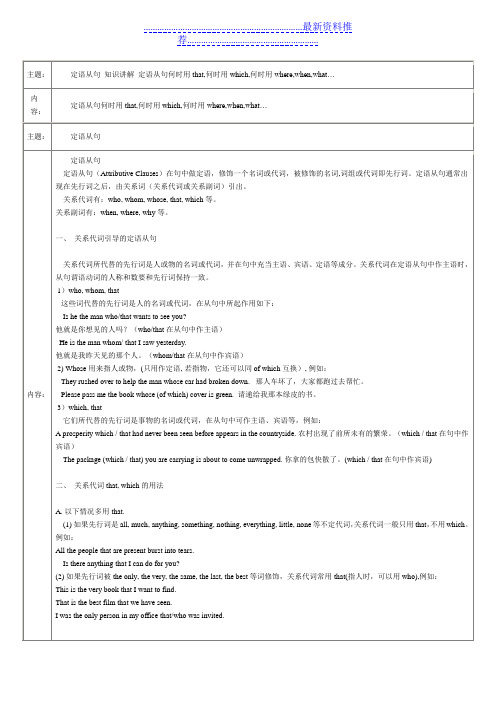
这些词代替的先行词是人的名词或代词,在从句中所起作用如下:
Is he the man who/that wants to see you?
他就是你想见的人吗?(who/that在从句中作主语)
He is the man whom/ that I saw yesterday.
三、关系副词引导的定语从句
关系副词可代替的先行词是时间、地点或理由的名词,在从句中作状语。
1)when, where, why
关系副词when, where, why的含义相当于"介词+ which"结构,因此常常和"介词+ which"结构交替使用,例如:
There are occasions when (on which) one must yield.任何人都有不得不屈服的时候。
(4) which还有一种特殊用法,它可以引导从句修饰前面的整个主句,代替主句所表示的整体概念或部分概念。在这种从句中,which可以作主语,也可以作宾语或表语,多数情况下意思是与and this相似,例如:
He succeeded in the competition, which made his parents very happy.
主题:
定语从句知识讲解定语从句何时用that,何时用which,何时用where,when,what…
内容:
定语从句何时用that,何时用which,何时用where,when,what…
主题:
定语从句
内容:
定语从句
定语从句(Attributive Clauses)在句中做定语,修饰一个名词或代词,被修饰的名词,词组或代词即先行词。定语从句通常出现在先行词之后,由关系词(关系代词或关系副词)引出。
定语从句(Ⅱ)(关系副词(when,where,why)

定语从句(Ⅱ)(关系副词(when, where, why)以及介词+whic h/whom引导的定语从句)1. 由关系副词(when, where, why)引导的定语从句。
关系副词用法例句注意when 其先行词是表示时间的名词,如time ,day ,hour, year等,when代替先行词在从句中作时间状语I still remember theday when I first methim.我仍然记得第一次见到他的那一天。
若时间名词后面的定语从句的引导词在从句中作主语或宾语,则改为which或that.Eg: This is the day (whic h/that)he will never forget.where 其先行词往往是表示地点的名词,如place,room , house ,street ,area 等,where代替先行词在从句中作地点状语I visited the farmwhere a lot of cowswere kept.我参观了那家养了好多奶牛的农场。
若地点名词后面的定语从句的引导词在句中作主语或宾语,则改为which或that.Eg : This is the place (which/that)he visited before.why 常用在先行词reason后,代替先行词在从句中作原因状语,也可用for whichI don’t know thereason why he looksunhappy today.我不知道他今天看上去不高兴的原因。
若reason后的定语从句的引导词在从句中作主语或宾语,则改为which或that.Eg: I don’t believe the reason(which/that)he gave me.2.“介词+关系代词”引导的定语从句在“介词+关系代词”引导的定语从句中,关系代词只能用which或whom,不能用that.先行词指物时,用which;先行词指人时,用whom.1)介词选择的三原则:①介词根据从句中谓语动词的搭配习惯而确定。
关系副词定语从句when,where,why
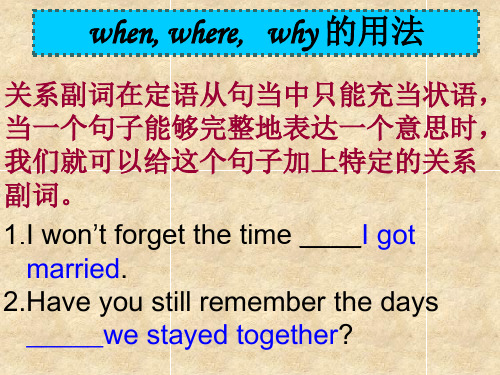
3.This is the place ____ we had a good time. 4.Is this the house ____ Mr. Smith lives? 5.I don’t know the reason ___ he won’t join us. 6.Do you know the reason ____ he didn’t come to sweep the classroom
Correct the sentences:
4. I’m going to work in the hospital where needs me. which 5. Those that haven’t been to the West Lake will gather at the school gate. who
Correct the sentences:
6.This is the last time when I’ve given you lessons. that 7. The reason which he explained it sounds reasonable. why
Correct the sentences:
when, where, why 的用法
关系副词在定语从句当中只能充当状语, 当一个句子能够完整地表达一个意思时, 我们就可以给这个句子加上特定的关系 副词。 1.I won’t forget the time ____I got married. 2.Have you still remember the days _____we stayed together?
3)、根据先行词判断,所用的介词与先行词 搭 配
This is our classroom , in the front of which _______________ there is a teacher’s desk.
怎么区别why引导的定语从句和同位语从句?

when,where 和why 引导的定语从句和同位语从句之区别when , where 和whey 既可以引导定语从句,也可以引导同位语从句,它们的相同点是在两种从句中都可以充当状语成分。
不同点是:when , where 和why 作关系副词引导定语从句时,有跟它们含义相应的先行词,如when的相应先行词是表示时间的名词,where 的相应先行词是表示地点的名词,why 的相应先行词是表示原因的名词。
当when , where 和why作连接副词引导同位语从句时,则没有与它们含义相应的先行词。
试比较:I'll never forget the day when ( = on which ) we met for the first time . ( 定语从句)I have no idea when we met for the first time ( 同位语从句)The office where ( = in which ) you work is here . ( 定语从句)Then arose the question where we were to get so much money . ( 同位语从句)The reason why ( = for which ) he did not come is quite clear . ( 定语从句)Xiao Wang has solved the problem why the TV was out of order . ( 同位语从句)以上例句中when , where 和why 作关系副词引导定语从句时,可以改为“介词+ 关系代词which”来引导;而引导同位语从句的when , where 和why 就不能这样改。
由此可知,why引导的若是同位语从句,先行词就不会是reason或其同义词;若是reason或其同义词作先行词,就一定是定语从句。
when where why引导的定语从句

定语从句简介
定语从句是指用来修饰名词或代词的从句。
它常常由引导词when(什么时候)、where(在哪里)和why(为什么)引导。
当引导词为“When”时
当定语从句修饰表示时间的名词或代词时,常常使用When作为引导词,如:•This is the school where I studied when I was a child.
•Do you remember the day when we first met?
当引导词为“Where”时
当定语从句修饰表示地点的名词或代词时,常常使用Where作为引导词,如:•I'll never forget the city where I spent my childhood.
•Can you show me the room where the meeting will be held?
当引导词为“Why”时
当定语从句修饰表示原因的名词或代词时,常常使用Why作为引导词,如:
•I don't understand the reason why he didn't come to the party.•That's the only explanation why she left early.。
由关系副词when, where, why引导的定语从句
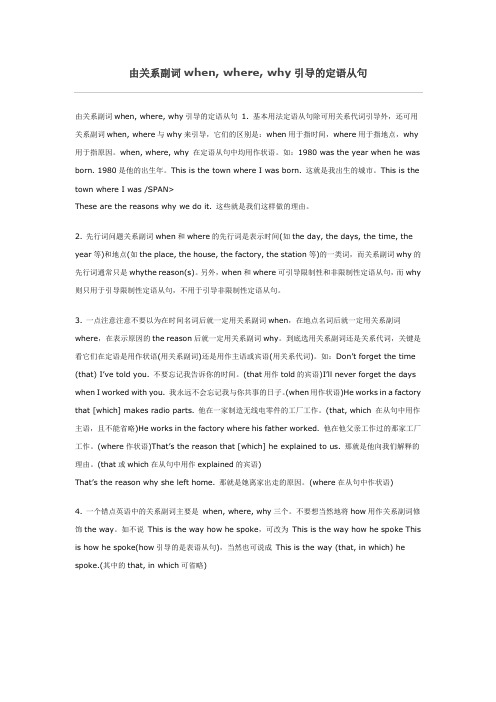
由关系副词when, where, why引导的定语从句由关系副词when, where, why引导的定语从句1. 基本用法定语从句除可用关系代词引导外,还可用关系副词when, where与why来引导,它们的区别是:when用于指时间,where用于指地点,why 用于指原因。
when, where, why 在定语从句中均用作状语。
如:1980 was the year when he was born. 1980是他的出生年。
This is the town where I was born. 这就是我出生的城市。
This is the town where I was /SPAN>These are the reasons why we do it. 这些就是我们这样做的理由。
2. 先行词问题关系副词when和where的先行词是表示时间(如the day, the days, the time, the year等)和地点(如the place, the house, the factory, the station等)的一类词,而关系副词why的先行词通常只是whythe reason(s)。
另外,when和where可引导限制性和非限制性定语从句,而why 则只用于引导限制性定语从句,不用于引导非限制性定语从句。
3. 一点注意注意不要以为在时间名词后就一定用关系副词when,在地点名词后就一定用关系副词where,在表示原因的the reason后就一定用关系副词why。
到底选用关系副词还是关系代词,关键是看它们在定语是用作状语(用关系副词)还是用作主语或宾语(用关系代词)。
如:Don’t forget the time (that) I’ve told you. 不要忘记我告诉你的时间。
(that用作told的宾语)I’ll never forget the days when I worked with you. 我永远不会忘记我与你共事的日子。
when,where,why引导的定语从句
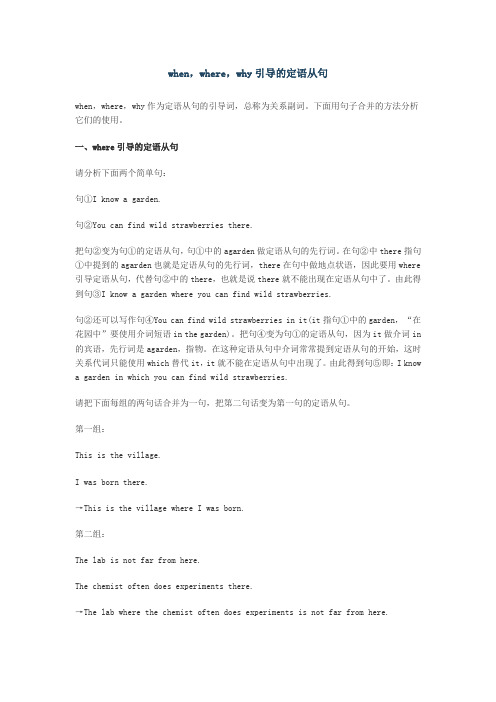
when,where,why引导的定语从句when,where,why作为定语从句的引导词,总称为关系副词。
下面用句子合并的方法分析它们的使用。
一、where引导的定语从句请分析下面两个简单句:句①I know a garden.句②You can find wild strawberries there.把句②变为句①的定语从句,句①中的agarden做定语从句的先行词。
在句②中there指句①中提到的agarden也就是定语从句的先行词,there在句中做地点状语,因此要用where 引导定语从句,代替句②中的there,也就是说there就不能出现在定语从句中了。
由此得到句③I know a garden where you can find wild strawberries.句②还可以写作句④You can find wild strawberries in it(it指句①中的garden,“在花园中”要使用介词短语in the garden)。
把句④变为句①的定语从句,因为it做介词in 的宾语,先行词是agarden,指物。
在这种定语从句中介词常常提到定语从句的开始,这时关系代词只能使用which替代it,it就不能在定语从句中出现了。
由此得到句⑤即:I know a garden in which you can find wild strawberries.请把下面每组的两句话合并为一句,把第二句话变为第一句的定语从句。
第一组:This is the village.I was born there.→This is the village where I was born.第二组:The lab is not far from here.The chemist often does experiments there.→The lab where the chemist often does experiments is not far from here.二、when引导的定语从句请分析下面两个简单句:句①We shall remember the days.句②We studied together then.把句②变为句①的定语从句,句①中的the days做定语从句的先行词。
when,where,why引导的定语从句的用法

when,where,why引导的定语从句的用法when,where,why引导的定语从句的用法想要掌握定语从句,需要掌握引导词的用法,下面是店铺分享给大家的when,where,why引导的定语从句的用法,希望对大家有帮助。
when,where,why引导的定语从句的用法篇1when, where, why属于关系副词,都在其引导的定语从句中充当状语,其具体用法如下:1.关系副词 when引导定语从句(包括限定性定语从句和非限定性定语从句)修饰表示时间的先行词,在定语从句中充当时间状语。
例如: I still remember the day when I first met Jennifer.我仍然记得第一次见到詹妮弗的那一天。
// Next month, when you’ll spend your summer holidays in your hometown, is approaching. 下个月即将来临,届时你们将在家乡度暑假。
2. 关系副词where引导定语从句(包括限定性定语从句和非限定性定语从句)修饰表示地点的先行词,在定语从句中充当地点状语。
例如: This is the office where he worked. 这就是他工作过的办公室。
// She is going to live in Macao, where she has some close friends. 她要到澳门去定居,在那里她有几个密友。
3. 关系副词why引导限定性定语从句修饰先行词reason,在定语从句中充当原因状语。
例如: I don’t know the reason why he came so late. 我不知道他来得那么晚的原因。
// That is the reason why I don’t want to go. 那就是我不想去的理由。
// He didn’t tell me the reason why he was so upset.他没有告诉我他为什么那样心烦意乱。
英语who when what where why的用法

who谁when什么时候what什么where什么地方why为什么which那一个hawmuch多少钱hawmany东西多少What:它主要问的是什么。
例句:What are you doing?(你在干什么?) What's this?(这是什么?)What's your job?(你的工作是什么?)When:它主要问的是什么时候。
例句:When shall we go there?(我们什么时候去那里?)When did this thing happen?(这件事什么时候发生的?)Where:它主要问的是在哪里。
Where are you?(你在哪里?) Where can we live?(我们住在哪里?) Where shall we go?(我们什么时候走?)How:它主要问的是怎样。
How can we go there?(我们怎样才能去那里?) How can I do this thing?(我怎样去做那件事情?)英语 what 用法一、用作疑问代词,用来构成特殊疑问句:1. 与表示人的名词或人称代词连用,用来提问对方或第三者的职业或身份。
例如:What is Comrade Liu? 刘同志是做什么的?“What are you?”“I'm a worker.”“你是做什么的?”“我是工人。
”2. 与介词like连用,表示“怎么样”和“象什么”的意思。
例如:What is the weather like today? 今天天气怎么样?What is the elephant's leg like? 大象的腿象什么?What does your girlfriend look like? 你女朋友长得什么样?3. 与about连用,用来表示征求意见或询问消息,表示“对于……怎么样”的意思。
例如:What (is your opinion) about going out for a walk? 我们出去散散步怎么样?You didn't recognize your uncle at the station at once? What about your elder sister? 你在车站没有立即认出你叔叔?那你姐姐呢?4. 与介词for连用,表示“为了什么目的”的意思。
- 1、下载文档前请自行甄别文档内容的完整性,平台不提供额外的编辑、内容补充、找答案等附加服务。
- 2、"仅部分预览"的文档,不可在线预览部分如存在完整性等问题,可反馈申请退款(可完整预览的文档不适用该条件!)。
- 3、如文档侵犯您的权益,请联系客服反馈,我们会尽快为您处理(人工客服工作时间:9:00-18:30)。
when,where,why引导的定语从句
when,where,why作为定语从句的引导词,总称为关系副词。
下面用句子合并的方法分析它们的使用。
一、where引导的定语从句
请分析下面两个简单句:
句①I know a garden.
句②You can find wild strawberries there.
把句②变为句①的定语从句,句①中的agarden做定语从句的先行词。
在句②中there指句①中提到的agarden也就是定语从句的先行词,there在句中做地点状语,因此要用where 引导定语从句,代替句②中的there,也就是说there就不能出现在定语从句中了。
由此得到句③I know a garden where you can find wild strawberries.
句②还可以写作句④You can find wild strawberries in it(it指句①中的garden,“在花园中”要使用介词短语in the garden)。
把句④变为句①的定语从句,因为it做介词in 的宾语,先行词是agarden,指物。
在这种定语从句中介词常常提到定语从句的开始,这时关系代词只能使用which替代it,it就不能在定语从句中出现了。
由此得到句⑤即:I know a garden in which you can find wild strawberries.
请把下面每组的两句话合并为一句,把第二句话变为第一句的定语从句。
第一组:
This is the village.
I was born there.
→This is the village where I was born.
第二组:
The lab is not far from here.
The chemist often does experiments there.
→The lab where the chemist often does experiments is not far from here.
二、when引导的定语从句
请分析下面两个简单句:
句①We shall remember the days.
句②We studied together then.
把句②变为句①的定语从句,句①中的the days做定语从句的先行词。
在句②中then指句①中提到的the days,也就是定语从句的先行词,then在句中做时间状语,因此要用when 引导定语从句,代替句②中的then,也就是说then就不能出现在定语从句中了。
由此得到句③We shall remember the days when we studied together.
句②还可以写作句④We studied together during the days.(介词短语during the days 含义为“在这些日子里”)。
把句④变为句①的定语从句,因为the days做介词during的宾语,先行词是the days,指物,在定语从句中介词during提前,用关系代词which替代the days,the days就不能在定语从句中出现了。
由此得到句⑤We shall remember the days during which we studies together.
请把下面每组的两句话合并为一句,把第二句话变为第一句的定语从句。
第一组:
I've always longed for the days.
I should be able to be independent then.
→I've always longed for the days when I should be able to be independent.
第二组:
There are moments.
I forget all about it then.
→There are moments when I forget all about it.
三、why引导的定语从句
请分析下面两个简单句:
句①He wanted to know the reason.
句②I was late for the reason.
把句②变为句①的定语从句,句①中的the reasons做定语从句的先行词。
因为the reason 做介词for的宾语,先行词是the reason指物,在定语从句中介词for提前,用关系代词which替代the reason,the reason就不能在定语从句中出现了。
由此得到句③He wanted to know the reason for which I was late.
注意:在定语从句中当先行词为the reason(s),定语从句由for which引导时,可以用why 代替for which。
由此我们得到句⑤He wanted to know the reason why I was late.
请把下面两句话合并为一句,把第二句话变为第一句的定语从句。
The reason is not very convincing.
He came for the reason.
→The reason why he came is not very convincing.
The reason for which he came is not very convincing.
■巩固性练习
一、合并句子
请把下面每组的两句话合并为一句,把第二句话变为第一句的定语从句。
1.There came a day.The rain fell at last then.
2.This is the hour.The place is always full of women and children then.
3.We will start at the point.We left off there.
4.Give me one good reason.I should help you for the reason.
5.This is the factory.His father works there.
6.I don't know the reason.You quarreled with him.
7.I'll never forget the days.We studied together then.
二、链接高考
1.All___is needed is a supply of oil.
A.the thing
B.that
C.what
D.which
2.Finally,the thief handed everything___he had stolen to the police.
A.which
B.what
C.whatever
D.that
3.In fact the Swede did not understand the three questions____were asked in French.
A.where
B.who
C.in which
D.which
4.Can you tell me the name of the factory___you visited last week?
A.what
B.where
C./
D.when
5.His parents wouldn't let him marry anyone___family was poor.
A.of whom
B.whom
C.of whose
D.whose
6.After living in Paris for 50 years he returned to the small town____he grew up as a child.
A.which
B.that
C.where
D.when
7.The film brought the hours back to me____I was taken good care of in that far-away village.
A.until
B.that
C.when
D.where
参考答案
一、合并句子
1.There came a day when the rain fell at last.
2.This is the hour when the place is always full of women and children.
3.We will start at the point where we left off.
4.Give me one good reason why I should help you.
5.This is the factory where his father works.
6.I don't know the reason why you quarreled with him
7.I'll never forget the days when we studied together.
二、高考答案:1-5 BDDCD 6-7 CC。
